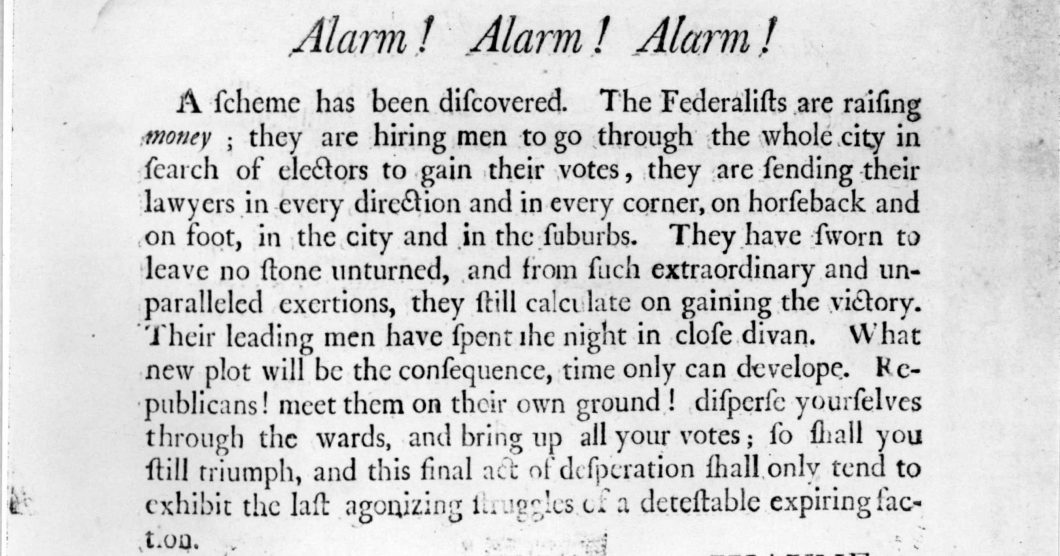Centinel's Argument Against Bicameralism
James Madison famously wrote in Federalist 51 that “A dependence on the people is, no doubt, the primary control on the government; but experience has taught mankind the necessity of auxiliary precautions.” Madison discussed the separation of powers between executive, legislative, and judicial branches, the additional division of the legislative branch into two chambers, and how their design can create a political invisible hand by which “the private interest of every individual may be a centinel over the public rights.”
I don’t know whether Madison employed the word “centinel” in this sentence to jab at the Antifederalist writer Centinel, who several months before lambasted the idea that separation-of-power systems can be designed to generate public virtue from the interaction of self-interested politicians. Perhaps. Contrary to Madison’s argument, however, for Centinel, only engaged and attentive citizens can keep politicians in line, not institutional designs that ostensibly create self-enforcing constitutional systems. There is no invisible hand for Centinel, at least not in politics.
Far from auxiliary precautions supplementing the control people provide themselves, Centinel argued these precautions can be democratically debilitating; they actually decrease control people exercise over their government. Here he saved all his powder for legislative bicameralism, taking the Pennsylvania state constitution as his model, since at the time, the state had a unicameral legislature, albeit with separated executive and judicial branches.
Centinel argued bicameralism hindered the ability of citizens to monitor government officials. He articulated a form of what today we term “rational ignorance”: “[T]he great body of the people never steadily attend to the operations of the government and for want of information are liable to be imposed on.”
Bicameralism, Centinel argued, increases the informational demands on ordinary citizens. As a result, citizens will be unable to provide the oversight needed to keep self-interested politicians in check. Far from providing an additional (or “auxiliary”) check on government abuse, splitting the legislature into two separate bodies reduces the effectiveness of the only real check there is, that of the people themselves. Centinel wrote:
If you complicate the [constitutional] plan by various orders, the people will be perplexed and divided in their sentiments about the source of abuses or misconduct; some will impute it to the senate, others to the house of representatives, and so on, that the interposition of the people may be rendered imperfect or perhaps wholly abortive.
Alongside term limits and rules aimed intentionally to slow down the legislative process, adopting a “simple structure of government” in the form of legislative unicameralism increases the ability of citizens to hold politicians accountable. “[F]or then whenever the people feel a grievance they cannot mistake the authors and will apply the remedy with certainty and effect, discarding [the legislators] at the next election.”
According to Centinel, unicameralism reduces blame shifting across the chambers, and so increases the ability of ordinary citizens to hold politicians accountable. The obverse holds perforce: bicameralism allows blame shifting across the chambers, decreasing the ability of citizens to know who is responsible for what. Thus, Centinel concludes that far from being an auxiliary precaution that increases the accountability of government, bicameralism decreases accountability to the public.
Of interest is that a couple of years later, when Pennsylvania debated its move to legislative bicameralism, James Wilson responded in part to Centinel’s claim that bicameralism was too informationally demanding on citizens. Wilson articulated an informational rationale for bicameralism, arguing that what I call the acoustic separation of bicameral chambers results in the adoption of informationally superior laws relative to those enacted by a unicameral process. His argument is essentially an institutional variant on the old adage “two heads are better than one.”
Contrary to Centinel’s argument, however, the informational superiority of bicameralism in Wilson’s account proceeds at the level of the system rather than the level of the voter. It, again, is a means by which separation-of-powers in the legislative branch mechanically, or automatically, produces superior outcomes. Wilson sketches something of an informational invisible hand process.
More broadly, one might wonder whether institutional “auxiliary precautions” in separation-of-power systems might induce moral hazard in citizen oversight. To the extent that citizens believe second legislative chambers, or judicial review, or the executive veto—the checks and balances system writ large—creates oversight to the behavior of politicians’ behavior, then citizens might be induced by the ostensibly insurance effect of these auxiliary precautions to provide less personal oversight than they would personally provide in less separated, more unitary systems. If so, decreased citizen oversight might offset any increase in accountability created by auxiliary precautions. The net effect might be no net increase in holding government officials responsible, or even an overall decrease.
In any event, Centinel provides us with an argumentative tour de force against the idea that separation-of-powers systems generate self-regulating political equilibria. That doesn’t mean he’s right, but his challenge is serious, and bracing—particularly given the near-canonical status accorded to Federalist 51.
Still, with all the delegation that has occurred in the U.S. government—legislative and judicial authority delegated to executive branch agencies, executive power to agencies independent of the executive branch, legislative power to the judicial branch (e.g., the U.S. Sentencing Commission), let alone the legislative immunization of executive branch agencies from control of the sole executive branch office actually vested with executive power—I wonder whether American politicians in the different branches have actually been ambitious enough to sustain their own institutional prerogatives. It would be ironic if American politicians were insufficiently ambitious to sustain an institutional system predicated on “ambition counteracting ambition.” Perhaps Centinel’s criticism that I discussed on Tuesday is most apt, that human wisdom is simply insufficient to create systems of institutional control that are truly self-enforcing.


